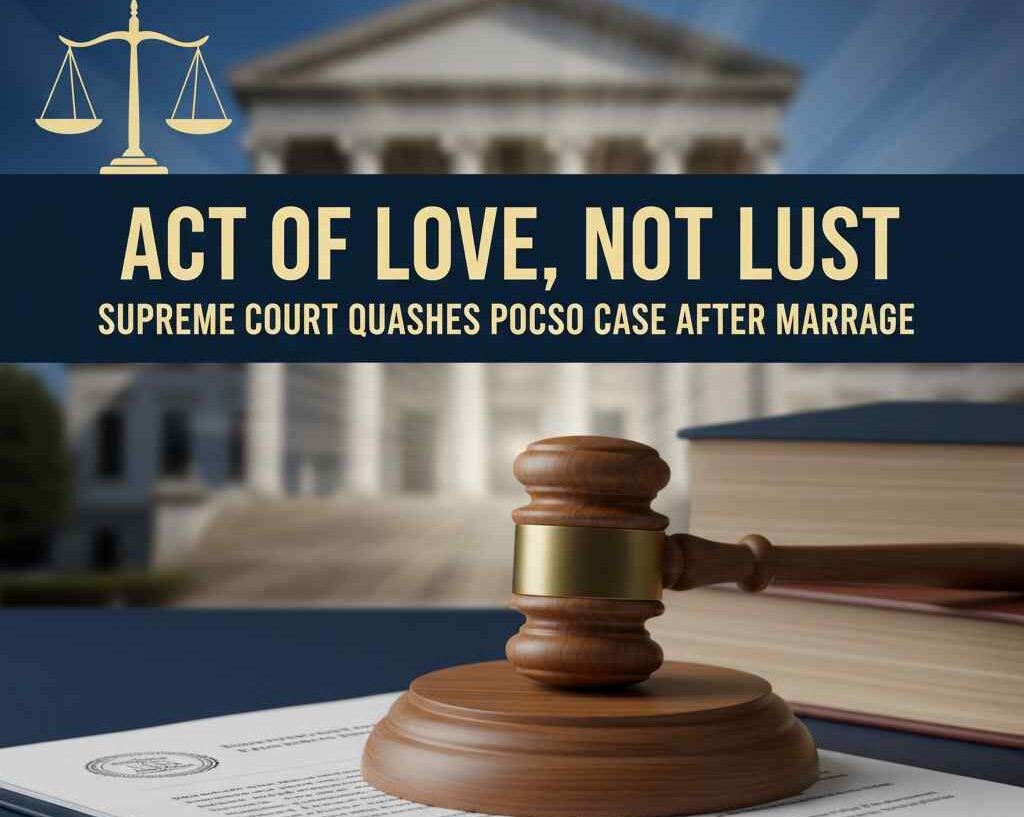The Supreme Court of India used its special powers under Article 142 to quash a POCSO case after a couple, once accused and victim, married and had a child. The Court said the act was driven by love, not lust, emphasizing compassion, rehabilitation, and justice.
Introduction
In a landmark judgment, the Supreme Court of India quashed criminal proceedings under the Protection of Children from Sexual Offences (POCSO) Act against a man who had been convicted for a relationship with a minor. The Court recognized that the relationship later culminated in marriage and family life, calling it “an act of love, not lust.” This ruling, while unique to the circumstances, reflects the Court’s willingness to adopt a compassionate and realistic approach to justice.
Background of the Case
The case involved a man who entered into a relationship with a girl when she was below the legal age of consent. Though he was initially prosecuted under the stringent provisions of the POCSO Act, the situation evolved when the couple married and had a child together.
The woman, now an adult, testified that she was living a happy and stable married life with her husband and supported the plea to quash the conviction. Even her father stood by the couple, requesting the court to end the legal battle for the sake of family peace and their infant child.
Court’s Observation
A bench of Justices Dipankar Datta and A. G. Masih observed that justice must balance legal firmness with human compassion. The court acknowledged that crimes under the POCSO Act are grave and meant to protect minors from exploitation. However, it added that the law cannot operate in isolation from human realities.
“We are conscious that an offence wounds the collective conscience of society, yet the administration of justice must reflect empathy and practicality,” the bench noted.
The Court stressed that continuing criminal proceedings in such a case would disrupt the family unit and harm not only the husband but also the wife and their infant son.
Article 142: Power to Do Complete Justice
Invoking Article 142 of the Indian Constitution, the Supreme Court exercised its plenary powers to ensure “complete justice.” This article allows the Court to pass any decree or order necessary to do justice in a particular case, even if it goes beyond statutory limitations.
While normally, offences under POCSO cannot be quashed based on compromise, the Court held that strict adherence to law without considering the victim’s voice would defeat the ends of justice. The bench thus chose compassion over punishment.
Warning and Limitations
The Court made it clear that this judgment should not be treated as a precedent for future cases involving minors. It was based solely on the unique facts — a consensual relationship that matured into marriage and family life.
The bench also issued a stern warning to the man, directing him to support and maintain his wife and child for life. Any neglect or desertion in the future could invite severe legal consequences.
Significance of the Ruling
This decision underscores the judiciary’s evolving understanding of consensual relationships among young couples and the need for context-sensitive justice. It highlights the balance between legal deterrence and human rehabilitation, recognizing that every case demands a nuanced evaluation.
FAQs: Act of Love, Not Lust: Supreme Court Quashes POCSO Case After Marriage
Can all POCSO cases be quashed after marriage?
No. The Court specifically mentioned that this decision is not a precedent and applies only to exceptional cases where the relationship was consensual and has led to marriage and family life.
Why did the Court call it an act of love, not lust?
The Court found that the relationship was genuine and based on mutual affection, not exploitation or coercion — key factors that differentiate love from lust in law’s eyes.
What warning did the Court give to the accused?
The Court directed him to support his wife and child throughout life. Any failure to do so could bring harsh consequences.
Conclusion
The Supreme Court’s ruling in this case blends law with empathy, acknowledging that justice must consider both societal norms and individual circumstances. While protecting minors remains paramount, this case shows that love and human compassion can sometimes guide the path to true justice.

























